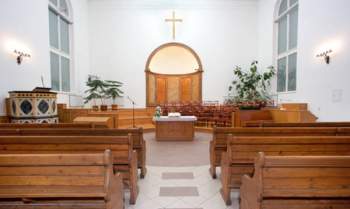
Is there a Religious Importance of Marriage?

Popular In Marriage
Common Law Marriage Louisiana Common Law Marriage Massachusetts Common Law Marriage Nevada Common Law Marriage Ohio Marriage Certificate Common Law Marriage Kentucky Free Marriage Records Putative Marriage Definition Common Law Marriage Alaska Common Law Marriage Oklahoma Common Law Marriage Mississippi Common Law Marriage New Mexico
Many times, religion plays a large role in marriage. In fact, religion often plays a role in the relationship before the marriage even takes place. In some cases, couples take part in religious premarital counseling. This counseling is meant to ensure that couples are fully aware of the implications of religion in their marriage. In addition, religious marital counselors will offer the couple advice on keeping religion as a priority during marriage.
This is especially necessary in times of conflict or distress for the couple. Counseling helps couples learn to utilize religious tools for conflict resolution in order to bring each other closer together in the face of diversity. In some cases, couples involve individuals of two different religious faiths.
On occasion, one spouse may be converting to the other spouses religion before marriage. In that case, religious counseling will help that individual by imparting specific religious teachings to introduce them to the church. Often, conversion takes place before the wedding, so that the ceremony is focused on just one faith. Spouses sometimes convert so that children can be raised in one religion, helping parents to avoid conflict and confusion. However, some couples maintain separate religious faiths and take part in an interfaith wedding ceremony.
Either way, premarital religious counseling is often a requirement for couples wishing to be married in a church. Religion often plays a large role in the wedding ceremony as well. There are often prayers included in the ceremony. In fact, several prayers are usually included in the wedding ceremony, in order to bring the congregation together with God. In addition, there are many traditional and symbolic acts that take place during a religious wedding ceremony.
Those often include readings from specific religious texts. Many times, close friends and family members will take part in reading those texts to the wedding guests, while focusing their reading on the couples future together. Each religion will offer specific traditions an symbolism for a wedding ceremony. For couples choosing a religious wedding, those traditions are meant to strengthen their bond with each other their faith. Many times, couples have some input as to which traditions are present during their ceremony. In any case, religious wedding ceremonies represent the couples new life together, while reinforcing their faith.
Background:
Religious marriages have a background rich in tradition and symbolism. Often that tradition becomes evident during the marriage ceremony. Each religion will have specific traditions that take place during the ceremony in order to represent the couples mutual respect for religion and religious principles as they apply to the relationship.
Many traditions have been utilized for centuries. Those traditions represent real life applications of the religious teachings that take place during the ceremony. In general, the religious elder that officiates over the ceremony, will speak about harmony between the couple and their faith. Religious teachings often involve supportive evidence though specific readings of religious texts.
Many times, religious wedding ceremonies involve religious songs. Sometimes, guests participate in the music, and other times the music is performed for the crowd. In general, religious weddings require that guests take part in symbolic gestures, such as kneeling in prayer on behalf of the couple.
Christianity:
Christian weddings involve many religious traditions that have been practiced for centuries. While there are some variations in Christian wedding ceremonies, most contain the same core elements. Many Christian couples take part in premarital religious counseling in order to become better prepared for the marriage bond.
In fact, couples learn how to confront difficulties in their relationship through a reliance on their faith and in God. In addition, couples learn about the symbols that will be included in their wedding ceremony. Couples will find these traditions to be more significant when they can appreciate the symbolism behind them. In some cases, couples may choose to write their own vows. Often, their religious counselor will help so that couples can come to terms with putting their feelings into words.
During a Christian wedding ceremony, there are many prayers in which individuals take part. Those prayers include blessings for the couple, as well for their guests. It is believed that collective prayer is more powerful than individual prayer. However, there is sometimes a moment of silence so that people can say a silent, personal prayer.
This helps guest to be included in the union and for guests to offer collective support to the couple's marriage. In some Christian wedding ceremonies, couples and their guests break bread and drink wine to signify the body and blood of Christ. This is to remind the congregation of God's sacrifice in order to offer them salvation. In many ways, a Christian wedding is like church services, with the addition of wedding vows between the couple. Yet, it is not likely that all guests will be of a common religious faith. Guests are expected to participate out of respect for the couple and their faith.
Judaism:
Jewish wedding ceremonies are steeped in religious tradition. There are many symbolic gestures that take place during the ceremony. The meanings behind those gestures are meant to be carried into the marriage. In Jewish marriages, the woman in considered to be the head of household and the man is required to care for her needs.
In addition, men can be of a different religious faith, but children are expected to be raised in the religious tradition of the mother. There are many symbolic gestures that take place during the Jewish wedding ceremony, and couples are expected to be aware of their significance to the marriage contract. In the past, engagement ceremonies often took place a year before the wedding ceremony.
However, many couples now combine the two ceremonies. Couples take part in symbolic gestures to represent their agreement to take part in the marriage contract. In fact, the Rabbi will read the religious marriage contract aloud to reinforce the ideas of spousal responsibility for each other and to the community.
The Jewish marriage contract is very specific in regards to the husband's responsibility for meeting all of his wife's needs. If in fact, if the man cannot care for her as he is required, he is instructed to divorce her. However, the man is still required to care for most of his bride's needs even after the divorce. Jewish marriages are based on mutual caring and respect, in addition to the observance of religious practices.
Islam:
Muslim weddings often include many similar traditions utilized before, during and after the ceremony. First, couples must mutually agree to take part in the marriage. In some cases, the couple's representatives, usually family members, may agree to the marriage on behalf of the couple.
The marriage is generally accepted after a gift or token has been presented to the bride's family. In fact, that gift is used to ask the bride's family for her hand in marriage. The tradition of asking the bride's family for permission is found among many religions. It is utilized to show respect for the bride's family. Before a Muslim wedding takes place, the couple makes a public declaration of their acceptance of the wedding contract.
That proclamation must take place in front of at least two witnesses. The Muslim wedding ceremony is full of many symbolic religious traditions that bring focus to the religious elements involved in the marriage contract. Like many religions, Muslim men are required to attend to the needs of their wives. In Muslim marriages, there is a mutual understanding of the importance of faith in the relationship. In fact, the focus of all Muslim marriages is on religious principles and teachings as they pertain to individuals and to the couple.



















